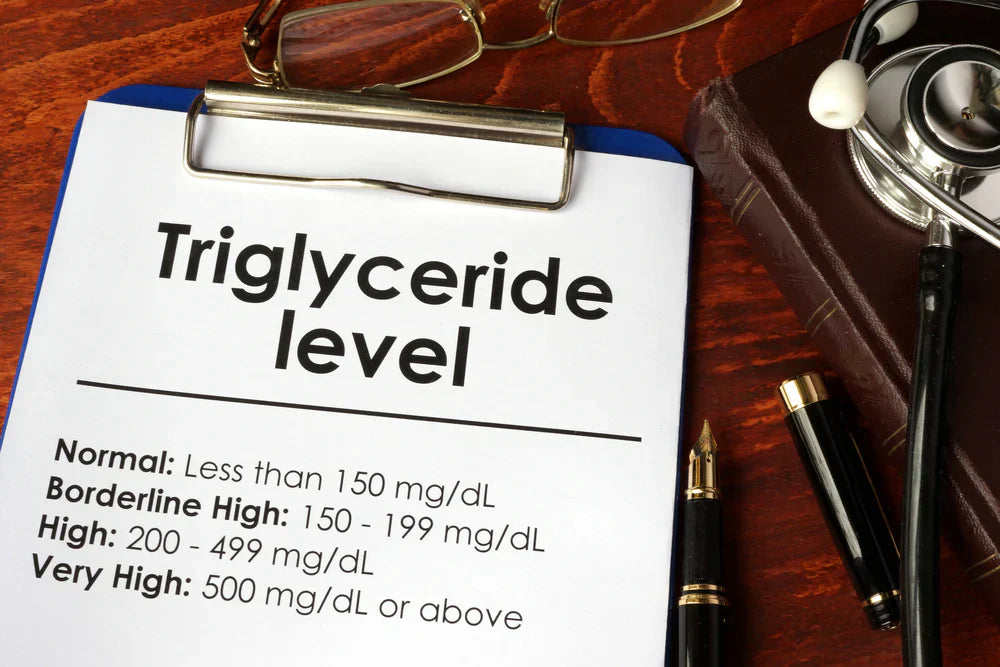More than a third of adults in the United States have high levels of triglycerides. Triglycerides are a type of fat, or lipid, in your blood that your body uses for energy. Triglyceride levels are typically considered normal when they are less than 150 mg/dL. Anything above 200 mg/dL is considered high. High levels of triglycerides can lead to a number of health issues. Here are some of the potential long-term effects of having elevated triglycerides:
1. Type 2 Diabetes
Elevated triglycerides can increase your risk of prediabetes and type 2 diabetes. This is because having moderately high to very high triglyceride levels can put you at a greater risk of inflammation in the pancreas, called pancreatitis. If your pancreas becomes damaged and can’t work properly to produce the right amounts of insulin, your blood sugar levels can get too high. This can lead to the development of type 2 diabetes, a chronic condition that needs to be carefully managed.
2. Atherosclerosis

The more triglycerides you have in your blood, the higher your risk of developing atherosclerosis. Atherosclerosis is the gradual buildup of plaque in your arteries. Over time, this can lead to various artery diseases. Carotid artery disease occurs when plaque builds up in the arteries that supply your brain with blood. Coronary artery disease involves the buildup of plaque in the arteries that supply your heart with blood. Peripheral artery disease affects the arteries that supply blood to your arms and legs. Without treatment, these diseases can lead to heart attack or stroke.
3. Fatty Liver Disease
Elevated triglycerides are associated with liver problems and are a common cause of fatty liver disease. Fatty liver disease occurs when too much fat builds up in the liver. These fat deposits cause the liver to swell and become damaged. Though fatty liver disease does not usually cause symptoms, it can worsen over time and lead to serious liver scarring (cirrhosis) and even liver cancer.
4. Heart Disease

Having high levels of triglycerides in your blood puts you at a higher risk of heart disease. Heart disease is the leading cause of death for men and women in the United States. People with elevated triglycerides tend to also have other risk factors that contribute to heart disease, such as high blood pressure, high cholesterol, obesity, and high blood sugar. High triglycerides can affect your cholesterol levels, leading to lower levels of “good” HDL cholesterol and higher levels of “bad” LDL cholesterol. This further increases your risk of heart disease.
How to Reduce Elevated Triglycerides
Discovering that you have high levels of triglycerides may seem concerning. LIV Formula 1 is a dietary supplement that helps manage phospholipid metabolism in the liver and promote cardiovascular health. Some patients and providers have reported significant positive changes in their triglycerides after taking LIV Formula 1.
In addition, there are certain lifestyle changes you can make to reduce elevated triglycerides. Physical activity can have a huge impact on triglyceride levels, so aim to get a minimum of 30 minutes of exercise five days a week. If you are overweight, losing a few pounds and maintaining a healthy body weight can also help. Make changes to your diet, such as eating fewer foods with unhealthy fats, trans fats, cholesterol, and processed sugars. Your diet should be high in fruits, vegetables, lean proteins, and low-fat dairy. Limit your alcohol intake, too, as even small amounts of alcohol can cause big spikes in triglycerides.
If you have any questions about ways to lower your elevated triglycerides or how to manage your health conditions, please reach out to us at Phipps Pharmacy today and our knowledgeable team will be happy to help!

